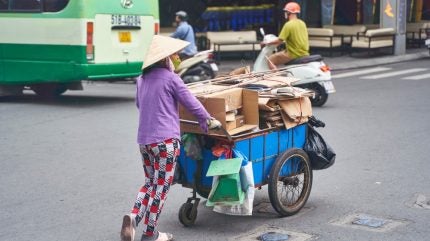
Vietnam’s recycling industry is undergoing a profound shift due to the introduction of EPR regulations.
The new law, under Decree No. 08/2022/ND-CP, mandates that manufacturers and importers take responsibility for managing the end-of-life of the products they place on the market.

Discover B2B Marketing That Performs
Combine business intelligence and editorial excellence to reach engaged professionals across 36 leading media platforms.
This regulation, which came into effect on January 1, 2024, is expected to significantly change how businesses handle waste, from packaging materials to electronic devices and tyres.
By shifting the burden of waste management from consumers and local authorities to producers, Vietnam is aiming to create a more sustainable recycling system and support the country’s long-term environmental goals.
Compliance requirements for producers and importers
Under the EPR framework, producers and importers of certain products must ensure that their goods are properly collected, reused, and recycled at the end of their lifecycle.
These products include plastic packaging, batteries, tyres, and electronic goods like smartphones, computers, and televisions.

US Tariffs are shifting - will you react or anticipate?
Don’t let policy changes catch you off guard. Stay proactive with real-time data and expert analysis.
By GlobalDataCompanies now have two options to fulfil their responsibilities: they can either build their own recycling systems or contribute to the Vietnam Environmental Protection Fund (VEPF), which is designed to support the country’s recycling infrastructure.
One of the most notable aspects of the EPR regulations is the inclusion of mandatory recycling targets. These targets will increase every three years, encouraging businesses to innovate and improve recycling rates over time.
For example, packaging used in food products, cosmetics, and medicine must meet strict recycling quotas, promoting circularity in the packaging sector.
As Vietnam continues to embrace the circular economy model, the EPR policy will play a crucial role in reducing waste and improving sustainability across industries.
Challenges in electronic waste recycling
Among the various waste streams addressed by the EPR regulations, electronic waste (e-waste) is one of the most challenging.
The rapid technological advancements in artificial intelligence and high-tech devices, coupled with the relatively short lifespan of electronic products, make e-waste recycling a complex issue.
Devices such as smartphones, laptops, and televisions often contain valuable materials, including precious metals like gold, silver, and copper.
However, these materials are difficult to extract, and the recycling process itself can be costly and technically demanding.
In Vietnam, there is a growing need for advanced recycling facilities that can safely and efficiently handle e-waste, recovering these precious materials while preventing environmental harm.
This presents both a challenge and an opportunity: while the technical requirements for recycling e-waste are high, they also create potential for investment in the development of state-of-the-art recycling technologies.
The growing issue of tyre recycling
Tyre recycling has emerged as another critical issue under the new EPR rules.
Although recycling tyres provides significant environmental benefits, including reducing landfill waste and recovering valuable materials such as steel and rubber, the process itself can be problematic.
If not managed properly, tyre recycling can result in pollution, especially if the technology used is outdated or inefficient.
The Vietnamese government is actively working to address these concerns by implementing stricter standards for tyre recycling and ensuring that the technology used meets environmental and health guidelines.
The shift towards better tyre recycling practices is part of the broader goal to minimise pollution and improve public health while promoting sustainable practices in waste management.
Enforcement and future developments
The enforcement of EPR regulations in Vietnam is supported by the establishment of a national electronic portal for compliance.
This platform allows manufacturers and importers to register their products, submit recycling reports, and contribute to the VEPF. Failure to comply with the regulations can lead to penalties, reinforcing the government’s commitment to ensuring that EPR obligations are met.
The government is also taking steps to refine the EPR regulations over time. In early 2025, amendments were introduced through Decree No. 05/2025/ND-CP, which further optimised recycling requirements and introduced new management fees for certain industries.
These updates reflect the government’s proactive approach to improving recycling standards and strengthening the circular economy.
A new era for recycling in Vietnam
The introduction of EPR regulations marks a pivotal moment in Vietnam’s efforts to tackle waste management and promote environmental sustainability.
By holding producers accountable for the full lifecycle of their products, these regulations pave the way for a more circular economy.
With the legal framework now in place, businesses are under increasing pressure to develop efficient recycling systems that align with national goals for waste reduction, resource recovery, and sustainable development.
As the Vietnamese recycling industry continues to evolve under the influence of EPR laws, it is clear that both challenges and opportunities lie ahead.
Companies that embrace innovation in recycling technologies will play a key role in shaping the future of sustainable waste management in the country, contributing to a greener and more sustainable Vietnam.





